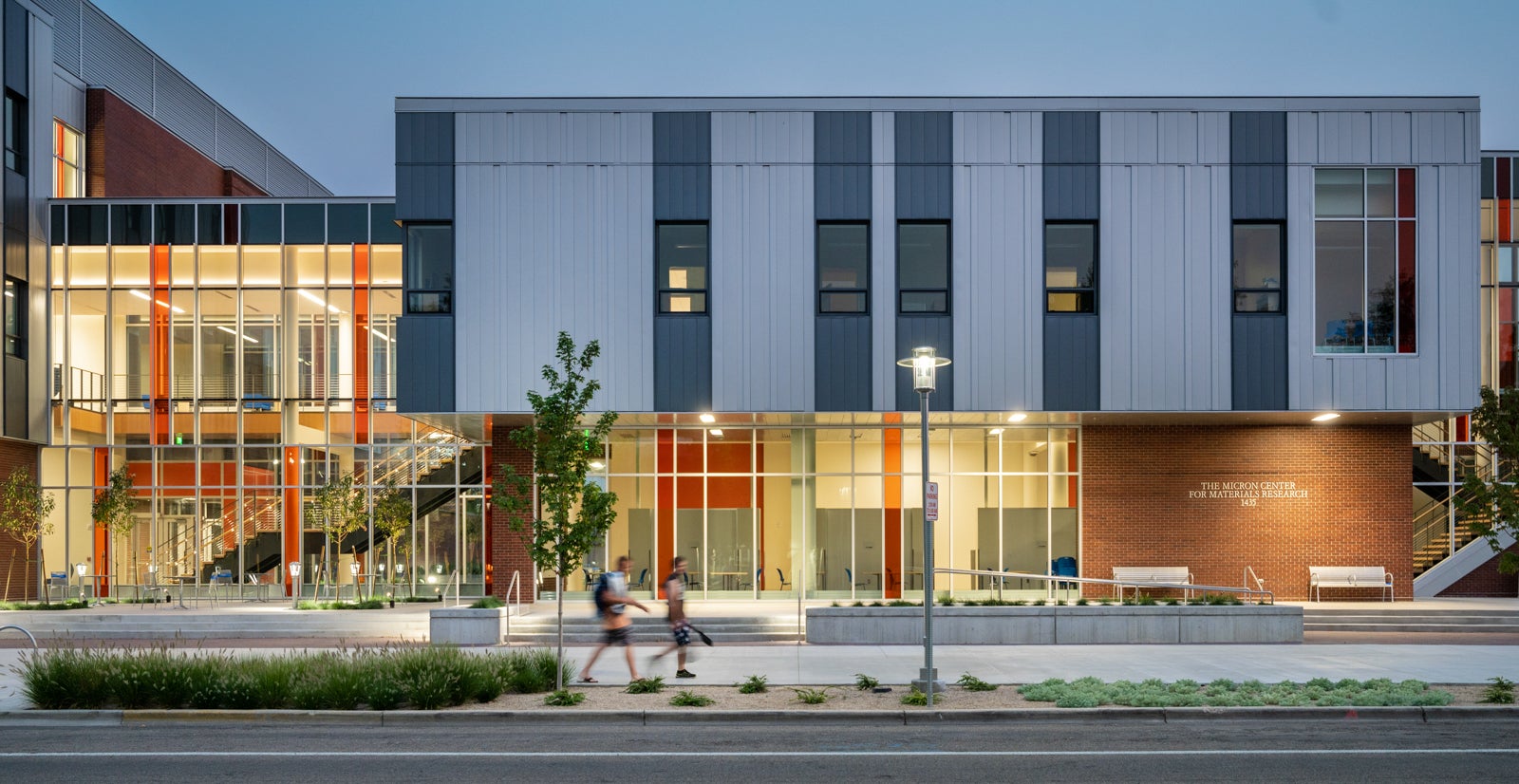
For the past two academic years, doctoral students from the Micron School for Materials Science and Engineering (MSMSE) have received the Graduate College’s Distinguished Scholar award. Students Pete Barnes and Evan Smith received these awards because of their scholarship throughout their time in the materials science and engineering (MSE) graduate program.
The Distinguished Doctor Scholarship is one of five annual awards distributed by Boise State’s Graduate College. These awards recognize the scholarly achievements of graduate students in the arts, STEM and non-STEM areas of study.
“The strength and quality of the MSE Ph.D. program is evidenced by these awards,” said JoAnn Lighty, College of Engineering dean. “We’ve seen remarkable growth for a program in only its ninth year.”
The pair of MSE doctoral students were nominated consecutively after being awarded the department’s Graduate Researcher of the Year award in 2020 and 2021, respectively. The students were nominated by advisors within the College of Engineering.
2021 Distinguished Scholar Pete Barnes

Pete Barnes, the Graduate College’s 2021 award recipient, has long been considered a top student in the Micron School of Materials Science and Engineering. Barnes completed his undergraduate degree at Boise State in 2014 before joining the graduate program in 2015. During this time, Barnes was no stranger to awards.
He received the 2014 Outstanding Graduate award from the Department of Chemistry and Biochemistry, and was one of seven undergraduates in the nation who received the Organic Division of the American Chemical Society Summer Undergraduate Research Fellowship in 2013.
“It is a privilege to have my thesis considered as one of the most distinguished of the graduate college, especially since I know the amazing work of my peers,” Barnes said. “They pushed me to achieve more than I thought possible and I hope they continue to be that beacon as they begin their careers at universities, national laboratories and industry.”
Barnes’s research, “Nanostructured Niobium Oxides as Negative Electrodes for Lithium and Sodium Ion Batteries,” focused on new synthetic routes for novel metal oxide electrode materials for rechargeable batteries. This research has the potential to accelerate the discovery of new energy materials and effectively reduce the cost of development.
“Pete has always demonstrated strong and consistent motivation in research, attention to detail, critical thinking, and excellent ability to carry out challenging research,” said Claire Xiong, Micron School of Materials Science and Engineering associate professor and Barnes’ advisor. “He has shown the quality of a devoted and true scientist through his patience and persistence and focus on details.”
Barnes’s work has been published in seven high-impact peer-reviewed journal publications including Chemistry of Materials, Journal of Power Sources and Journal of Materials Chemistry. Additionally, Barnes has two first-authored pieces under review at Nature Materials and Small. His research led to an honorable mention for the National Science Foundation’s Graduate Research Fellowship Program in 2016.
“I’m amazed at the level of support and opportunity the members and faculty of the College of Engineering provided not only to myself, but to every student, each day,” Barnes said. “My accomplishments were all made possible through the work with my mentor Dr. Xiong, my graduate committee, the Center for Materials Characterization and numerous laboratories. There are too many to list, but I hope they know how important they are to me.”
His research publications provide insights on discovering new avenues to make materials of practical importance, how battery degradation can effectively accelerate the development of commercial sodium ion batteries, and how ordered nanomaterials can be created with the use of electropolishing and anodization.
2020 Distinguished Scholar Evan Smith

Evan Smith, the Graduate College’s 2020 award recipient, has a long and heavily involved academic resume. Before completing his bachelor’s degree in applied mathematics with a minor in physics, Smith came from Cerro Coso Community College in California, where he received associate degrees in mathematics, engineering, general science and liberal arts.
Smith transferred to Boise State in 2014 to complete his undergraduate degree before starting graduate school in MSMSE in the fall of 2016. Upon his arrival in Boise, Smith joined the Boise State Undergraduate Microgravity Research Team his senior year, as well as the MSE Club, Phi Kappa Phi honor society, Students Helping Integrate Fellow Transfers, Ski and Snowboard Club, and the Bowling Club.
“With all the high-quality research being conducted in our department, I’m honored to be the first recipient of this award from MSMSE,” Smith said. “It feels great to be recognized for all the hard work that I put into my research.”
Smith’s research, “Empirical Modeling of Structural Distortions in Perovskite Ceramics” focused on developing predictive models for composition structure-property relationships specifically for electroceramic materials. These models can significantly accelerate the development of new materials and effectively reduce the cost of the development.
“Evan has been instrumental in his service to MSMSE since he arrived in 2014,” said Rick Ubic, director of the Boise State Center for Materials Characterization and Smith’s mentor. “He has been instrumental in his service as an editorial assistant for the Materials Research Bulletin and mentoring several REU undergraduates in the lab.”
Smith’s work has been published in five first-authored peer-reviewed papers giving insights into issues such as how industry can save significant amounts of time and money, how new materials and devices can be developed effectively at an accelerated pace, and how accurately behaviors or phenomena can be predicted. His research has already inspired work by other scientists as far away as Egypt and China.
“The support from the faculty and college was incredible,” Smith said. “I would especially like to thank Professor Rick Ubic for his outstanding mentorship throughout the entirety of my Ph.D. studies. He always found time to meet with me, answer my questions, and provide a wealth of knowledge and sound guidance for all my research projects.”
Smith also noted the support he received from Professor Dmitri Tenne, Lan Li, and the front office staff for the MSMSE department who helped contribute to his success during his time as a graduate student.
Learn more about the Micron School of Materials Science and Engineering here.
-by Jamie Fink